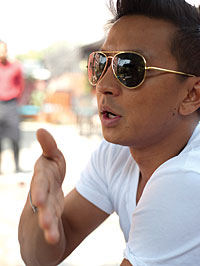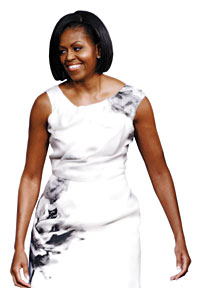 AHMAD ISKANDAR |
By now, most of us will have heard of Prabal Gurung. He stands out as a Nepali who's done real good, and done so from his base at the epicentre of the world of fashion, New York. What's as remarkable as the fact of his success is the timing. While the global recession has seen uber-trendy fashion houses like Christian Lacroix falter and fall, the house of Prabal Gurung is making waves. Certainly Michelle Obama and American Vogue editor Anna Wintour think so.
When Entrepreneurs for Nepal met at Dwarika's Hotel a fortnight ago, a roomful of youth sat rapt as Prabal sketched out the journey that had ushered him into international celebrity. Then the questions rained down, all the way from 'When can I hope to buy a Prabal Gurung handbag in Kathmandu' to 'How do you manage the global positioning of your brand?' In such sore times as these, it was a celebration not only of Prabal, but of what a Nepali success can mean, backed by a desire to find out how to get there.
I've my own set of questions when I meet the 36-year-old designer in Vesper Caf� a few days later, but I quickly realise how clear Prabal is about who he is, and how easily he articulates the substance of what he believes in.
He's keen to point out, first off, that he's no overnight sensation. 'I've paid my dues,' he says, simply. 'Of course it's been a pleasant surprise how quickly all the good things have happened in the last year. But I made sure I invested the time to learn every aspect of my craft, from the designing to the business end. I've spent a decade working in every part of this industry, planning to get where I am. And I'm not done yet," he adds, with emphasis. "This is just the beginning."
But how, I wonder, did you dare to launch your collection in the middle of a recession?
"It felt right, it was instinctive," Prabal replies, and the conviction with which he says it makes it seem absolutely normal that the First Lady of America should fancy a Prabal Gurung dress. "I was ready. Of course," he says, almost as an aside, "If it hadn't gone well I would have blamed it on the recession!"
 THAT DRESS: Michelle Obama makes Prabal Gurung's day |
"Great. I try to come back once a year, to be with family, to recharge. Sitting and waiting for you guys, with the birds chirping, even the noise of the cars, everything moves at a certain pace here," he smiles. "It has been different this time. What I've noticed is how people are genuinely happy for me. Not many people celebrate other people's success in Kathmandu, maybe it makes them feel smaller. But the younger generation is different �it's very encouraging."
Perhaps they see what's possible for them? He agrees, and I ask him what he'd say to all those Nepalis, home and abroad, who may consider investing in Nepal.
"Do your homework, believe in yourself, and just go for it."
Certain such phrases take on the form of mantras. It seems almost too easy, I think. But they do sum up what Prabal is about, and the passion with which he explains himself ("I'm extremely lucky to be working in a field I love") soon dissipates cynicism.
It's not as if he doesn't know how difficult doing business is in Nepal. His own attempts to enlist garment factories in Nepal for his collection initially ran into difficulties with on-time delivery. "But every city has its challenges."
Doesn't Nepal have more challenges than most?
Looking ever so slightly shamefaced, Prabal confesses he relies on family to keep up with the merry-go-round of Nepali politics. But he is ambiguous about the relevance of democracy in a largely illiterate country. "Democracy isn't freedom at any cost," he says. On the subject of ethnicity, he is very clear. "I see myself as a human being first. The house I grew up in � a Gurung father and Rana mother � was a melting pot. I know it's not the same for many people here, but I do hope that those minorities seeking a voice don't repeat the patterns of what they are fighting against, and don't limit themselves to expressing themselves through ethnicity."
These seem sound sentiments. But I'm keen to see how Prabal balances the reality of Nepal with the unreality of models earning $10,000 an hour in New York. Isn't fashion frivolous, and irrelevant to Nepal?
 |
It won't happen overnight, and neither did Prabal. "I'm extremely patient, and I'm very demanding. As long as people don't strive for excellence, as long as they are happy with mediocrity, it won't happen. People need to put in the work, be original, and look beyond borders, and I think Nepali youth are beginning to do that."
It's only when he tries to convey to me how it's possible that he isn't totally carried away by his success that he struggles, for the first time, to find the right words. "I'm just not," he insists, "I have so much more to do." It may seem hard to believe, but through all the hype, Prabal sees himself as "an ordinary guy in an extraordinary situation". Heroine haru le layera ta ho ni! he says self-deprecatingly, and falls back on his family, and his mother. "If you met her, you'd know exactly what I mean. She's always been like, what's next?"�
It's hard to say what's next for Prabal beyond the next collection. He knows better than anyone else how fickle the world of fashion can be. But he is living proof that even in the extraordinary world of fashion, the ordinary virtues of hard work, supplemented by no little talent, can prevail. He's set to be a big fish in a very big pond. And for anyone who has seen Prabal Gurung dance Nepali jhyaure to booming house music, his stars hitched to his own chariot, his success will come as no surprise, and is impossible to resent.


